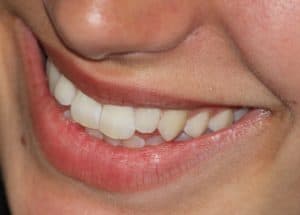Periodontitis is a common dental condition that can affect both children and adults and is caused by the accumulation of periodontal bacteria on teeth and gums. Poor oral hygiene often causes gingivitis that can easily lead to periodontitis. Inflammation or bleeding of the gums could be signs of periodontitis and the effects of this gum disease could lead to serious overall health issues if left untreated.

Photo by ChristianAagaard on Pixabay
The Development of Gingivitis and Periodontitis
Gingivitis can develop when plaque forms on the teeth. Plaque is a filmy substance composed of sugars, starches and bacteria. Plaque can form quickly on the teeth, but daily brushing usually prevents any build up. When plaque build up occurs and remains on the teeth, the once sticky film hardens and becomes tartar.
Commonly found under the gingiva (gumline), tartar (also known as calculus) forms and can become a breeding ground for bacteria. The longer plaque and tartar remain on the teeth, the more difficult it is to remove. If periodontal bacteria grows and is not constantly washed away with oral hygiene methods such as brushing, flossing, and mouth rinse, inflammation may begin. Once inflammation occurs it can worsen and gingivitis can develop into periodontitis. A variety of oral health concerns are associated with this level of gum disease.
Signs of Gingivitis and Periodontitis
Periodontitis is a serious oral health issue that should not go untreated. Infections from gum disease can spread and lead to lung and heart disease. Signs that you may have gingivitis or periodontitis can include:
- Bleeding gums
- Sore or swollen gums
- Receding gums
- Halitosis (Bad breath) that does not go away with brushing
- Loose teeth
- Red, purple, or puffy gums
- Infection or pus between gums and teeth
- Shifting teeth, new gaps between teeth
If you notice one or more of the symptoms listed above you may have periodontitis. Early detection and treatment of gum disease can prevent a series of unwanted health issues. Seek professional dental assistance immediately if you feel you are at risk for having periodontitis.
Contributing Causes of Periodontitis and Gingivitis
While anyone can be at risk for developing gum disease (even children); there are many contributing factors that are associated with periodontitis. Poor oral health is the most common cause of gingivitis that can lead to periodontitis. Eating sugary foods that increase bacterial growth combined with lack of regular brushing can be the onset of gum disease.
Side effects of some medications can also increase your risk for gum disease. Medicine commonly prescribed to treat seizures, high blood pressure or even birth control pills could increase one’s risk of developing gum disease. If you are taking any medications and notice any signs or symptoms of periodontitis consult your doctor about side effects you may be experiencing. Also, be sure to let your dentist know what medications you are on so that you can be treated accordingly. Sometimes, you can try an alternative medicine that does not lead to gum problems while other solutions such as increasing oral preventative care are recommended.
Dental concerns such ill fitting bridges can prompt bacterial growth that can lead to gingivitis and periodontitis. Also, teeth that are crooked or too close together and difficult to clean are also areas of concern where periodontal bacteria can develop.
Immune deficiency disorders like leukemia, HIV/AIDS, and cancer patients that undergo chemotherapy or radiation can greatly increase one’s risk of developing periodontitis. It is important for individuals experiencing compromised immune systems to maintain oral health care as part of their treatment plan.
In addition, hormonal changes that occur during menstrual cycles and pregnancy can also alter the bacterial growth in the mouth that can contribute to the development of gingivitis or periodontitis. Aging populations are also at increased risk for the appearance of gum disease.
Smoking and chewing tobacco can also greatly increase one’s risk of gum disease. If you use tobacco products and are experiencing oral health problems you may want to consider reducing or quitting this damaging habit.
Furthermore, nutrition can play a vital role in oral health. Poor nutrition including vitamin C deficiency is linked to periodontitis. Having a dry mouth can even create an environment for periodontal bacterial growth which can develop into gum disease. Thankfully, gingivitis and periodontitis is preventable and treatable.
Oral Care to Prevent or Reduce Periodontitis and Gingivitis
Lifestyle choices can have an affect on your oral health. For example, a balanced diet with plenty of calcium, vitamin C, and water can help keep your mouth healthy. Reducing or eliminating the use of tobacco products can also be a game changer in reducing the risk of developing periodontitis. General care of teeth, gums, and mouth is vital for prevention and treatment of gingivitis or periodontitis.
Brushing twice a day as recommended by the American Dental Association (ADA) plays an important role in your oral health. For optimal cleaning the ADA suggests brushing with a soft bristle toothbrush for two minutes; once in the morning and once at night before you sleep.
Flossing and rinsing your mouth are additional ways to reduce unwanted bacteria on teeth and gums, especially after eating or drinking sugary or acidic foods and beverages. Routine visits to the dentist are also highly recommended for periodontitis prevention. Professional cleanings can remove plaque and tartar buildup that regular brushing at home can’t.
Schedule a Dentist Appointment
Beyond regular visits to your dentist, once or twice a year depending on your dental needs; addition appointments may need to be scheduled if you are experiencing signs of periodontitis. Periodontitis can be a serious condition and early detection and treatment can prevent potential tooth loss, bone damage, as well as heart and lung related problems from infection. If you are concerned about gum disease, schedule an appointment with Dr. David Evans today.
